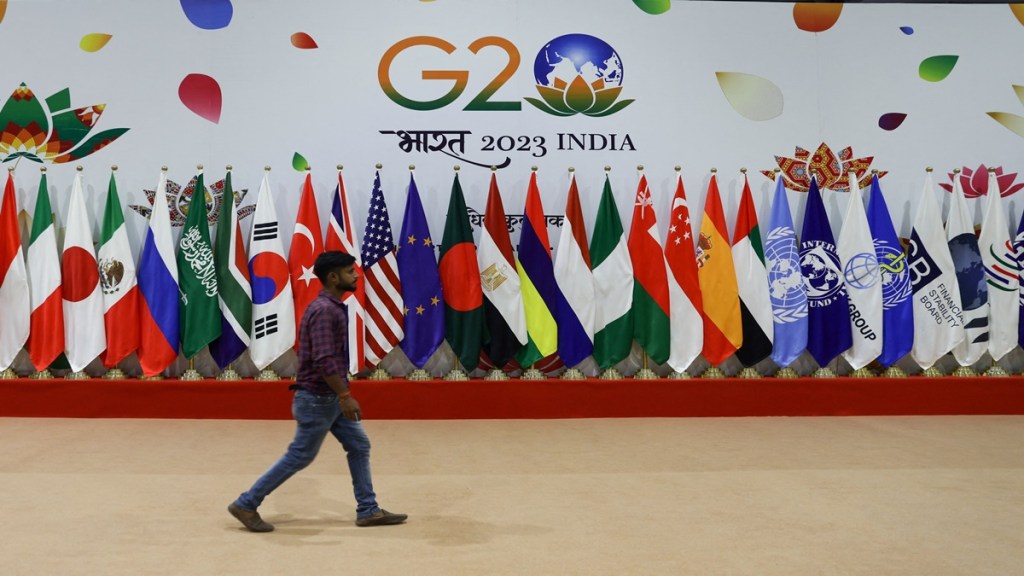India is gearing up to host the biggest G20 summit ever, and it’s going to be a significant event. There will be 41 delegations and leaders attending, and the summit will take place over one and a half days and will consist of three important sessions.
The first session, called “One Earth,” will happen on the morning of September 9th. The second session, “One Family,” will take place on the evening of September 9th. Finally, the third session, “One Future,” will be held on the morning of September 10th.
Delhi Declaration
Before the summit begins, there’s exciting news about the “Delhi Declaration.” Amitabh Kant, India’s sherpa to the G20, mentioned that this declaration is almost ready. What’s unique about it is that it will strongly represent the voices of the Global South and developing countries. This means it will reflect the thoughts and concerns of countries that are still growing and developing.
Amitabh Kant emphasized the importance of this declaration, saying, “No document in the world would have such a strong voice for the Global South and the developing countries.” It’s like these countries are making sure their ideas and issues are heard.
However, he also pointed out that the declaration isn’t final yet. It will be recommended to the leaders, and they will need to accept it before it becomes official. So, there’s still some work to be done before we can talk about what this declaration will achieve.
Amitabh Kant also shared some background about India’s role in the G20. When India took over the G20 presidency in Bali last year, the world was going through a period of slow growth and productivity. This means the global economy wasn’t doing as well as it could.
During this challenging time, India decided to focus on the theme of ‘Vasudhaiva Kutumbakam,’ which means ‘the world is one family.’ Prime Minister Narendra Modi wanted India’s presidency to be inclusive, decisive, ambitious, and action oriented. In simple terms, he wanted everyone to work together, make clear decisions, aim high, and take action.
So, what were the big priorities during India’s presidency?
Two important things: sustainable development goals and climate action. Sustainable development goals, or SDGs, are like a to-do list for the world. They include things like ending poverty, reducing inequality, and protecting the environment. The problem is, it may not be possible to achieve many of these goals by the year 2030. That’s why it is crucial to speed things up and get back on track.
The other priority was climate action, which means doing things to protect our planet from things like pollution and global warming. India wanted to take a lead on “Green Development” in the context of climate action and climate finance. Climate finance is like money to help countries, especially in the Global South, deal with climate problems. This was a big deal because both SDGs and climate action need money to work, especially in developing countries.
About the absence of the Chinese Leader
Some people are concerned about whether the Chinese President, Xi Jinping, will agree to the joint declaration. The G20 Sherpa, Amitabh Kant, said that China is a big player in the world, and its relationships with other countries are different in multilateral settings like the G20. He also pointed out that every country has the power to say no if they don’t agree with something.
Speaking of war, the Sherpa said this has been a topic of discussion in recent G20 meetings. War can cause problems for the economy and for achieving the SDGs. This year, they’re talking about how to deal with these issues.
On the financial side of things, Economic Affairs Secretary Ajay Seth mentioned some important priorities. These include making sure multilateral development banks are strong and can help countries, supporting growth that’s good for everyone, discussing vulnerabilities (which means weaknesses that can harm economies), including more people in the financial system, and figuring out how to regulate blockchain, which is a kind of technology used for things like cryptocurrencies.
Foreign Secretary Vinay Kwatra explained that the summit’s agenda is designed to include everyone. The summit will have three main sessions: “One Earth,” “One Family,” and “One Future.” These sessions will take place over two days, and there will also be other events alongside the summit. Plus, there’s going to be a fancy dinner hosted by the President of India.
Guests arriving
Foreign leaders and important people have already arrived in New Delhi for the summit, which starts on September 9th and goes on until September 10th. Prime Minister Narendra Modi has a busy schedule with more than 15 meetings planned. He’ll be holding bilateral talks with leaders like US President Joe Biden, Bangladesh PM Sheikh Hasina, and Mauritius PM Pravind Jugnauth. They’ll be discussing important stuff like making jet engines in India, buying armed drones, civil nuclear agreements, and trade.
But there are a couple of leaders who won’t be attending the summit. Spain’s caretaker Prime Minister, Pedro Sanchez, won’t be there because he tested positive for COVID-19. Russian President Vladimir Putin is also skipping the summit, which is similar to what he’s done in some other international meetings after the Ukraine crisis. The Chinese President, Xi Jinping, is not attending either, although China has said it’s willing to work with everyone at the summit.
Background
The G20 Leaders’ Summit will happen on September 9-10. More than 30 heads of state will be there, along with top officials from the European Union, invited guest countries, and 14 heads of international organizations. This means some of the most important leaders from around the world will be talking about big issues.
There have been some disagreements in the past, especially when it comes to talking about things like war and how it affects food and energy around the world.
The city of Delhi has also stepped up security for the summit, and there are travel restrictions in place.
